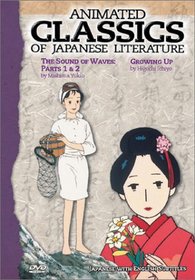| Genres: Anime & Manga, Animation Sub-Genres: Anime & Manga, Animation Studio: Central Park Media Format: DVD - Color - Animated,Subtitled DVD Release Date: 02/11/2003 Release Year: 2003 Run Time: 1hr 15min Screens: Color Number of Discs: 1 SwapaDVD Credits: 1 Total Copies: 0 Members Wishing: 1 MPAA Rating: Unrated Languages: Japanese Subtitles: English |
Search - Animated Classics of Japanese Literature - The Sound of Waves, Parts 1 & 2/ Growing Up on DVD
  | Animated Classics of Japanese Literature - The Sound of Waves Parts 1 2/ Growing Up Genres: Anime & Manga, Animation UR 2003 1hr 15min |
Larger Image |
Movie Details
We're sorry, our database doesn't have DVD description information for this item. Click here to check Amazon's database -- you can return to this page by closing the new browser tab/window if you want to obtain the DVD from SwapaDVD.
Click here to submit a DVD description for approval.
Similar Movies
Similarly Requested DVDs
|
Movie Reviews2 remarkable tales of young love set to beautiful animation Brian Camp | Bronx, NY | 01/30/2005 (4 out of 5 stars) "The "Animated Classics of Japanese Literature" series, made in 1986 but first released on VHS by Central Park Media in the U.S. in 1994, has seen four volumes so far come out on DVD, each with three episodes. This one includes a two-part condensation of Yukio Mishima's 1954 novel, "The Sound of Waves," and a short story written in 1895 by Higuchi Ichiyo, "Growing Up." The former is set in a Japanese fishing village in the years after the war and focuses on Shinji, a teenaged fisherman who has to work to care for his mother and pay for his little brother's schooling. When the richest man in town brings his 18-year-old daughter, Hatsue, back home to help him out, all the young men take an interest. Shinji soon has the upper hand although the father seems set on the arrogant Yasuo, head of the Youth Committee. The course of true love doesn't always run smoothly here, but unlike so many of the stories in this series, this one stays clear of tragedy. What's most striking about this adaptation is the way the animators painstakingly create a sense of place, with an emphasis on the behavior of the sea and its effect on the people's lives. There are frequent cutaways to the water and the waves hitting the shore and there is one adventurous sequence set at sea during a perilous storm, where Shinji is faced with a decision that will change his life forever. The character design is a little simpler than we'd like it, but the attention to details of village life and atmosphere make this tale of young love so much more vivid and affecting. "Growing Up" is set in the red-light Yoshiwara district of Tokyo in the early Meiji era and focuses on Midori, a pretty girl who is expected to follow in the footsteps of her sister, a prominent Geisha, and Shin, the son of a Buddhist monk derided as "a corrupt drunkard." Streetside taunts by other kids about a "monk" and a "whore" combine with an incident of bullying by Shin's friends to put a permanent rift in the two children's friendship. They're both soon overtaken by the unshakable destiny looming over their adolescence. There's an underlying sadness to it all, but the tale is laid out with such care and simplicity that we come to a state of understanding and acceptance rather than despair (although a tear might still work its way out, especially when we learn that the story's female author died a year after this story was written). The design and animation style are notably different from the rest of the series, with bolder lines, simpler forms, less shading, brighter colors and more of an illustrative look. The effect is quite stunning and especially evocative of the time and place, as if artists in the 1880s were given the tools to create manga and anime. " Strength of courage, not social status rules Japan? Charlotte Ann Hu | Arizona, USA | 02/27/2007 (5 out of 5 stars) "The sound of waves is a curious story in a culture dedicated to status. As the son of a poor widow, Shinji was forced to drop out of school after his father died in WWII. Despite his torn clothing, and humble origins, he dreams of the daughter of the village's richest fisherman. One of my favorite scenes is when he prays at a temple, asking God to make the fish plentiful, let the village prosper, thanks Him for his wonderful mother and brother and then asks if he might have a beautiful wife like Hatsue. Poignantly, he ponders if God will punish him for such a selfish prayer. The marvel of this story is that ultimately what decides Shinji's fate is his courage, honesty ... in short, his character. While the Japanese have always valued status, they also have nearly mythical concept of the gentleman warrior or samurai by which men are unconsciously, socially judged. This classic piece of Japanese literature shows these conflicting forces in the society. It is also a great piece to study Japanese language because the language is simple and relatively slow. The animation is simple, but sufficient." Animated artistry derived from Japanese literature Ronnie Clay | Winnsboro, Louisiana | 10/20/2005 (4 out of 5 stars) "These stories chosen range from celebrated novels like "The Harp of Burma," "Sanshiro Sugata," "Theatre of Life," and "The Sound of Waves," all of which were previously made into live-action films, to coming-of-age tales and short stories about the turbulence of young love, with titles like "Season of the Sun.""
|













